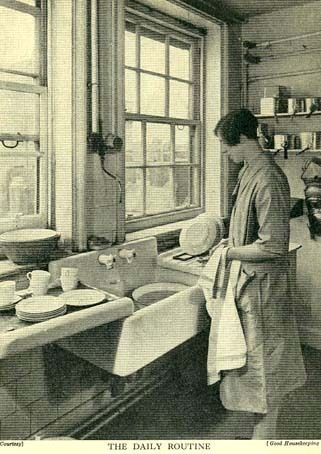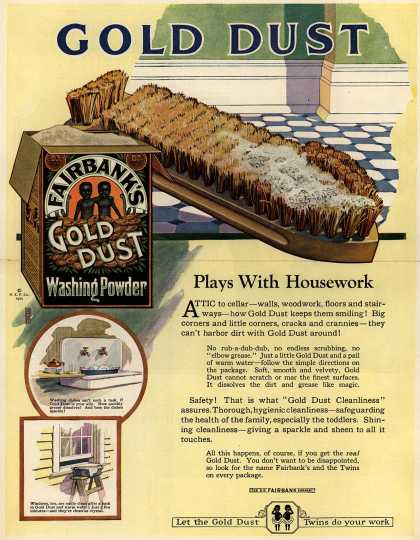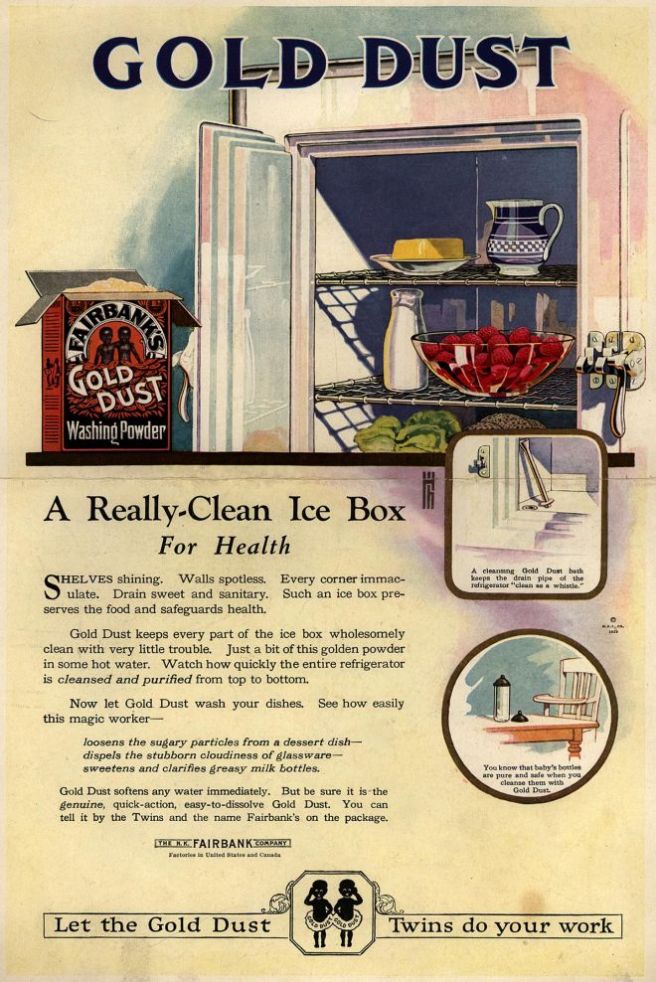Finding time is as good or better than finding a dollar. It is the busy people who generally acquire both.

Hello, again History Lovers,
In today’s world, Mrs. Elizabeth Wright might have posted her cleaning and organizing hacks on TikTok. However, in order to share household tips in her day, she wrote to The Farmer’s Wife—A Magazine For Farm Women where her letter was published in the March 1923 issue–just as homemakers were beginning to think about spring cleaning. The personal reward for her hard work was to have more time to do the things she loved outdoors.
Enjoy!


“When I first began doing my own work, I realized that I must be saving minutes if I would have any time left from my manifold household duties for things outside. May I tell you of some of the time savers I then attached to myself?
One of them was learning to dust with two dust rags instead of one. It was a little awkward at first but I soon found that I could manipulate a dust rag in each hand. I would make my left and right slide from opposite directions along bookshelves, door casings, table legs, arms and backs of chairs, and presto! My dusting was done in half the time. After two years of practice, I am almost expert enough to dust the picture molding with one hand and polish the floor with the other! This specialty in the line of timesavers caused much amusement among my friends, some doubting Thomas’s requiring a demonstration, after which they adopted the method for their own daily schedule.
I found this same two-handed principle worked in many things. In polishing silver, I use flannel mittens instead of rags and rub them with each hand. It also works magic in washing windows, scouring, and any other occupation in which one’s left hand has been accustomed to soldiering.
The next time saver I got hold of was avoiding the accumulation of mail, papers, and so forth. By forming a habit of looking over and disposing immediately of all not to be kept for reference or passing on, I eliminated the trouble of a second inspection, which would have been necessary if the things had been laid away and forgotten. Especially do I clean up empty envelopes, circulars, and other printed drift that the mail brings but no one needs.

Then I started the habit of keeping in the living room a work-basket, so as to have some pick-up sewing always handy. Putting in a few stitches now and then, when chatting with friends, will develop many embryo garments into finished ones. If the machine work is completed on undergarments, the hand-finishing goes quickly, done in this way. Then I always keep a magazine handy to read during moments snatched, here and there, while waiting for someone or something.

When setting or clearing a table I always use a large tray to carry the dishes. [A wheeled tray of course is ideal.] When the dishes are washed, I replace on the tray those that are to be used at the next meal; this saves putting them back and forth into the China closet. I scrape and stack the dishes before washing them, separating the glass and silver and by rinsing all of them in hot water the burden of drying is minimized. Polishing the glass and silver will be about all that is necessary. I fasten a small piece of rubber tubing to the bottom of each faucet and this lessens accidental chipping of dishes that might strike them.

White oilcloth on all my shelves and tables saves much labor. It is easily wiped and always looks fresh. When doing work that necessitates making any trash or stains, I protect my work table or the floor with old newspapers and gather up the debris in them. I keep all scraps of soap in a small tin can with a top well perforated. Boiling water poured over or run through this gives a nice suds and soap wastage is lessened.
It is a great convenience to have in the kitchen a bag for clean wrapping paper and string; also, a bill file, a pad of paper and pencil, a box containing some pins and needles, coarse thread for basting, a small pile of muslin and a pair of scissors. I keep fat drippings in a glass jar, also mayonnaise and cracker crumbs. I always have on a shelf in the kitchen a row of big and little jars and dishes for such uses.

I find it also of the greatest convenience to have a number of bags handy of different thicknesses of material. A canvas bag for crushing ice. Flannel for broom bags; small paper bags for parsley, mint, lettuce, or celery, into which they can be put when washed and then kept crisp on the ice. Also bags for straining things, for cottage cheese, and so forth. I keep a supply of these bags on hand made from scraps or sugar sacks as there is no limit to their usefulness. There is a large bag hanging in my pantry for soiled table and kitchen linen.
On a shelf in my linen closet there is also a row of clean (boiled) bottles and jars, culled from the periodical cleaning out of the medicine closet, and wonderfully convenient they are, when an empty jar or bottle is needed in a hurry.
I found out that in making beds one can save a lot of steps and time by finishing entirely the spreading of covers on one side of the bed, before going to the other side.

In the bathroom closet, I keep an extra broom, dustpan, and small ironing board. This has saved me many steps back and forth when they might be at different ends of the house when needed. If one has not a closet to hold them, keep them behind a curtain hung on a rod a foot or two from the wall, where a shelf can also be placed to hold bathroom conveniences and include in these a small jar to hold bits of soap, that can be made into liquid soap for shampooing or laundry work and bottles of disinfectant and cleaning powders.

There are so many more conveniences that I have discovered and ways of utilizing, what I call the discard, that I cannot tell it all at one time”. –Elizabeth M. Wright
~FWM

Love these suggestions, but I cannot imagine dusting with both hands.
LikeLiked by 1 person
My favorite part was her dusting the picture rail with one hand and polishing the floor with the other!
LikeLike
I am a little behind in my reading! Anyway, I might just try that dusting trick! I don’t much like to dust. Also, I was taught to make a bed the way she describes it. It works!
LikeLiked by 1 person